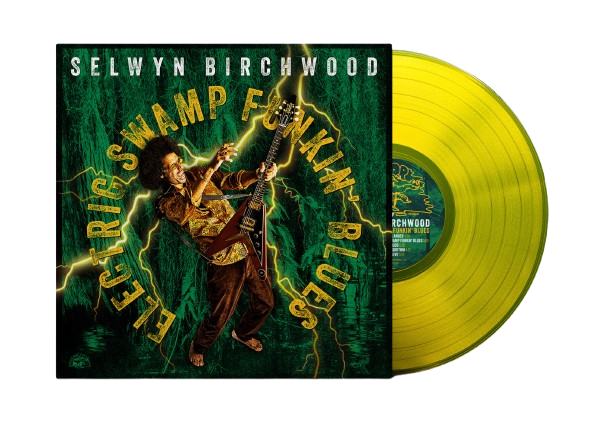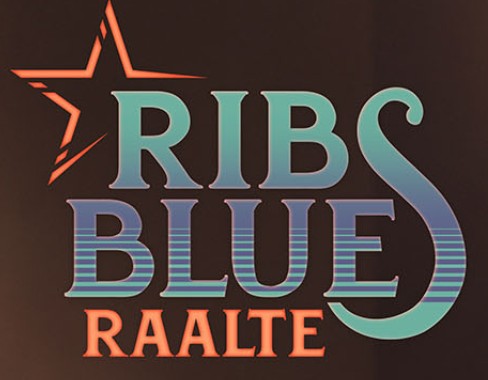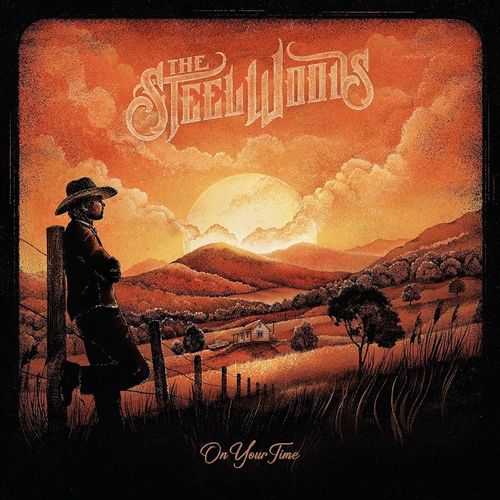“on your time”, they embark on a poignant and emotional journey loosely following the trajectory of uncle lloyd, a charming but dissolute character first introduced on the woods' debut album, 2017’s “straw in the wind.” this ambitious album not only showcases their musical evolution and episodic storytelling abilities but also serves as a tribute to the vision and legacy of their late co-founder, jason "rowdy" cope, who passed away just before the release of their third album, all of your stones. led by wes bayliss, the band’s guitarist, lead vocalist and co-founder, the steel woods have poured their heart and soul into this album, creating a record that reflects their resilience, growth, and unwavering spirit.
- The Man from Everywhere (5:11)
- Cut the Grass (7:00)
- Devil in This Holler (4:42)
- Famine Fortune (4:34)
- On Your Time (4:41)
- You Don't Even Know Who I Am (5:07)
- Border Lord (7:16)
- Stories to Tell to Myself (5:15)
- Broken Down Dam (6:12)
- If Not for the Rain (5:30)
Bio:
It’s a rare band that can make the blue-collar dreams of Southern rock’s pioneers relevant to modern audiences without sounding outdated. From the first, The Steel Woods have brought forward the enduring notions of self-reliance, hard work, family and faith expressed by artists from Lynyrd Skynyrd to Tom Petty to Merle Haggard, making them their own. The songs on their first three albums – Straw in the Wind, Old News and All of Your Stones -- combined the sincerity of country and forlorn bursts of class anguish and troublesome geography, underscored with the occasional stab of heavy-metal guitar to create a sound that is The Steel Woods’ own. What can you expect from a band that cites Willie Nelson, Waylon Jennings and Led Zeppelin among their influences?
Some artists start bands out of a need for fame and recognition, but then there are others who embark on a quest to find meaning, connection or to locate their tribe. Something that founding members Jason “Rowdy” Cope and Wes Bayliss seemed to intuitively know when they first met in a little bar in Dickson, Tennessee in 2015 and made plans to go fishing. Despite the 13-year difference in their ages, when you go fishing with someone you learn a lot about the depth of their soul, and by the end of the trip, they had formed an unshakable bond, and agreed to start a band together.
That propitious meeting ended up being the fulfillment of a mission Cope had to make the kind of music that made a difference in people’s lives, something that he’d been plotting since he moved to Nashville and for the ten years he was touring in country star Jamey Johnson’s band. While the two co-wrote songs, Cope had a cache of them stowed away for the right time and the right configuration of players. “That’s what he wanted from the first time I met him. I knew he was destined for something huge,” remembers Johnson.
Cope and Bayliss started drafting songs together on their frequent fishing trips and played out whenever they could, supporting acts such as Miranda Lambert, Skynyrd and Dwight Yoakam before headlining their own tours.
Their music caught the attention of Andrea von Foerster, the musical supervisor of Taylor Sheridan’s hit TV show Yellowstone, which featured “Axe,” from The Steel Woods’ debut Straw in the Wind, and “Blind Lover” from Old News. Their ascent was jolted when Cope passed away from diabetic complications in January 2021, just days after the band handed in All of Your Stones for release.
Much like Skynyrd and the Allmans before them, The Steel Woods were forced to make some hard decisions whether to carry on without a key member. There was never a shadow of doubt in co-founder, singer and multi-instrumentalist Wes Bayliss’s mind that he shouldn’t continue without his fallen partner. “It wouldn’t have been what Rowdy would have wanted,” says Bayliss simply, on the phone from his home an hour’s drive south of Nashville. “I feel bound to preserve his legacy. We did three records together, and with all the conversations we had, I think the two of us were on the same page about what the vision for the band and the records were. I think we’ll do this forever,” he says quietly, letting the words hang in the space between us.
It took about a year for things to settle, but in the first months of 2022, Bayliss, with longtime bassist Johnny Stanton and guitarist Tyler Powers, began thinking about their next record.
“We do release an album every two years typically. I didn’t want us to miss this one,” Bayliss says. “I kept saying we have to release a record next year. At the time there were probably two or three songs that were already demoed pretty well — 'Famine Fortune’ had been recorded in my studio in 2020 – but I’d say I wrote half the record toward the end of last of 2022.”
Some of the new songs were inspired by Bayliss’ four children, including “Cut the Grass,” and the title track, “On Your Own Time,” one of the album’s standouts.
“You change the way you write when you have kids,” Bayliss laughs. “I write about not driving too fast and watching how you spend your money,” he confides. “‘On Your Own Time’ is really about a father-son relationship. When I wrote the song, I was writing it to tell my kids all these things I thought that they needed to know and then reassuring them that they’re going to be fine. Even if – for whatever reason – they don’t take my word for it, they’ll remember this and they’ll learn each lesson on their own. Later, in the context of the album, it took on a bigger meaning.”
For the new album, Bayliss also had to change the way he wrote without Cope. “The way Rowdy and I wrote was not totally collective, with both parties present at all times. Rowdy would typically come to me with a half-written song and he’d ask me if I had any ideas for it. I might. I might not, or leave it for later. The same was true for me. The main thing was after one of us got a song almost there, then we could work out together. That was the strongest way to work for us, because if you have a big idea for a song it’s hard to make your partner see it in the same way you do. It was easier to get as far as you could, then bring it to him.
“Some of these songs that I wrote, like ‘Famine Fortune,’ there were a lot of gaps in the lyrics that I kinda left. I thought that the two of us would finish it, and then he passed. It might have been a different song if Rowdy was still here,” says Bayliss quietly.
“I think he would be proud of us and this record,” Bayliss adds. “You have to move forward in your life. That’s one of the messages I want for my kids and for the fans that come out to our shows.”
Moving forward does not mean that Bayliss abandoned one of The Steel Wood’s more compelling devices. Cope and Bayliss wrote five episodic story songs, murder ballads really, that told of a tragic love triangle between Della Jane, Anna Lee and Jimmy Sutherland, that played out over their three albums. Bayliss elected not to take the story further on the new album, saying, “It was so collaborative and it’s a piece of me and Rowdy’s time together, and I almost think anything I do now without him would devalue that.”
He did decide to bring back Uncle Lloyd, a character who appeared on their debut album. “Uncle Lloyd” was written by outside writer Darrell Scott. It’s a complicated story about a drifter who becomes part of the family although he’s not a blood relative. The song is told through the eyes of a narrator, the son of the man who took him in, who calls him Uncle Lloyd. The youngster enjoys the attention he gets from an adult, but asks the question “how a man at 57 ends up living so alone.”
On Your Own Time attempts to answer that question over its 10 songs without outright admitting that it’s a continuation of the story of Uncle Lloyd. The cover art – a close replica of Straw in the Wind – is by Karla Sanders, who did the artwork for the debut and it more than hints at the connection. The album’s first song, the “Man From Everywhere,” seems to serve as a prequel to the original Uncle Lloyd story, explaining how he came to leave his wife and family and head out on the open road. It was “Stories to Tell Myself,” a song Bayliss and The Steel Woods manager Derek Stanley wrote in 2018, that became the real inspiration for the album.
Come on in, pull up a chair.
I’ve got a story to tell. About a man from everywhere One that I knew so well.
In a land of longer days He used to travel around.
Swimming in his wicked ways
I guess he didn’t think he could drown.
“So, the continuation of Uncle Lloyd’s story is the whole album. There’s about half the record that is kind of negative, and it’s written from the perspective of Uncle Lloyd. Someone that’s got a lot they need to fix in their life, or a lot of things that they could’ve done differently. The other half is about having a role model who you probably shouldn’t even be hanging around with. Or an anti-role model, to show you how not to be,” explains Bayliss. “I didn’t see what the full message [of ‘Uncle Lloyd’] was right off the bat when we were going to put it on the first album. In fact, I don’t think I realized what it was about until after we’d recorded it. Then I saw parts of my own life in it.
“I had a few Uncle Lloyds in my life,” Bayliss continues. “I probably don’t do drugs because of the guys who worked for my family’s construction business. I watched the old guys on the crew go to their trucks and pop pills. I would hate to say that everybody I worked with was on drugs, but there were definitely people doing them in the time that I was around. I learned a lot from them, but I also learned these are the things you don’t want to do if you don’t want to be alone at 60 and still working construction.”
Although Bayliss identified with the Uncle Lloyd story, he had a twinge about whether it was right to base a follow-up concept on something neither he nor Rowdy wrote.
“I asked our manager if he’d get in touch with Darrell Scott. I had to give him this idea of continuing Uncle Lloyd’s story and pretty much get his blessing to move forward with it. ‘Please don’t let the thought that maybe I wouldn’t understand or I wouldn’t approve get in your way of going forward with this idea,’ Darrell said to me. ‘Art is everybody’s, for whatever purpose.’ The two of us ended up booking a writing session and we sat and talked for three-and-a-half hours and didn’t write a single lyric. He ended up playing a couple steel tracks on the record, so I definitely had his support, which made it all feel right for me.”
While all the songs don’t fit neatly into the Uncle Lloyd story, the ones that don’t are what happens to the narrator because he didn’t use Uncle Lloyd’s life as a role model; a twist on the road-not-taken story. There’s the minor-chord drama of “Devil in the Holler,” with its Jimi Hendrix guitar wizardry, a song full of uncommon wisdom and hard-won truths. “Famine and Fortune,” with its peerless blues guitar, is a contemporary retelling of the Adam and Eve story, while the tender introspection and stately waltz time of “If Not for the Rain” poses what big thinkers believe about the rudiments of happiness: There is no love of life without despair of life.
In addition to the original compositions, The Steel Woods included two deeply felt cover songs that nudge the narrative along. Gretchen Peters’ “You Don't Know Who I Am” is about the breakdown of a marriage from both the male and female point of view, and Kris Kristofferson’s swampy “Border Lord” is filled with cosmic unease and some anxious harmonica, chronicling a man on the run running out of time.
“I think the only way it’s a first album is that Rowdy has left here; it’s the first time I’m working without him. I’ve had to take whatever we learned together and the things I’ve learned from him and from the music and the road and everything else. It’s a totally different formula, but at the same time it’s very similar. It’s almost like he is here and contributing, because we’re not moving in a different direction. Everything has changed, but we’re still looking up the same hill.”








Geen opmerkingen:
Een reactie posten